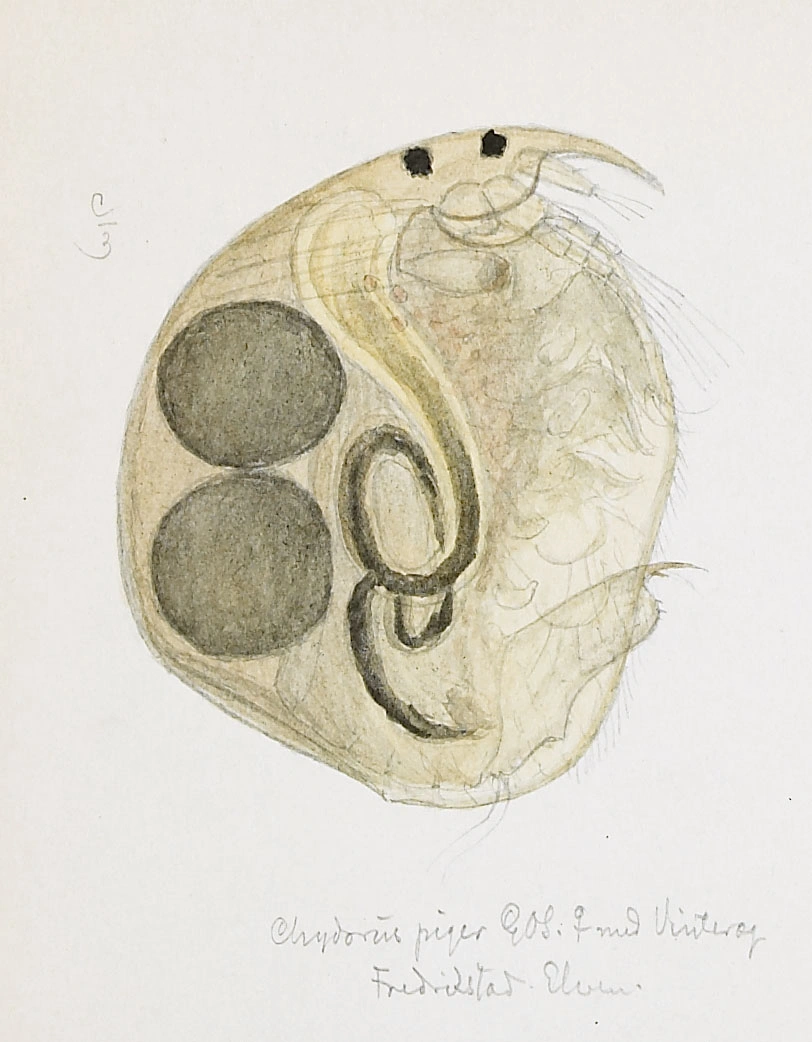Paralona pigra
Paralona pigra is most common on sandy bottom in the littoral of large water bodies. It can be distinguished from C. sphaericus by having stronger teeth on the rounded end of the postabdomen. P. pigra is classified as an acid-sensitive species.
Key characteristics
Paralona pigra (female)
Seen from the side, the shape of Paralona pigra is less rounded than for example C. sphaericus. The posterior part of the carapace is somewhat elongated and rounded. The species is characterized by the indistinct diagonal striping of the ventral and posterior part of the carapace. Its postabdomen is rather short and wide, tapering towards the end where the rounded part carries 10 rather long denticles on each side. Its colour is light yellow.
Female: Length 0.3–0.5 mm
Male: Length 0.3–0.4 mm
Ecology and distribution
Paralona pigra is found in 5 % of the localities. It is found once in northern Norway (Lake Kapervatnet, Senja), while it has a scattered distribution in the rest of the country. P. pigra is found from sea-level and up to above timberline, with its highest frequency below 500 m a.s.l. The species is most common in the littoral of large water bodies (>10 ha) where it is associated with sandy bottom. Though the species have been found twice at pH<5,0 it is classified as an acid-sensitive species. Conductivity varies between 0.8 and 42 mS/m.
| Vitenskapelig navn | < 4,5 | 4,5 - 4,9 | 5,0 - 5,4 | 5,5 - 5,9 | 6,0 - 6,4 | 6,5 - 7,0 | 7,0 - 7,4 | > 7,5 |
|---|---|---|---|---|---|---|---|---|
| 0 | 2,2 | 6 | 5,4 | 9,6 | 5,8 | 3,6 | 2,4 |
| Vitenskapelig navn | < 1,0 | 1,0 - 1,4 | 1,5 - 1,9 | 2,0 - 2,9 | 3,0 - 3,9 | 4,0 - 4,9 | 5,0 - 6,9 | 7,0 - 9,9 | > 10,0 |
|---|---|---|---|---|---|---|---|---|---|
| 1,5 | 2,6 | 5,2 | 5,7 | 6,4 | 5,6 | 6,5 | 2,8 | 3,5 |
| Vitenskapelig navn | < 0,01 | 0,01 - 0,09 | 0,1 - 0,9 | 1,0 - 9,9 | 10,0 - 99 | 100 - 999 | > 1000 |
|---|---|---|---|---|---|---|---|
| 0 | 0 | 1,6 | 2,2 | 5,8 | 14,6 | 13 |
| Vitenskapelig navn | < 100 | 100-299 | 300-499 | 500-699 | 700-999 | >1000 |
|---|---|---|---|---|---|---|
| 6,8 | 7,2 | 6,5 | 2,4 | 1,6 | 0,7 |
